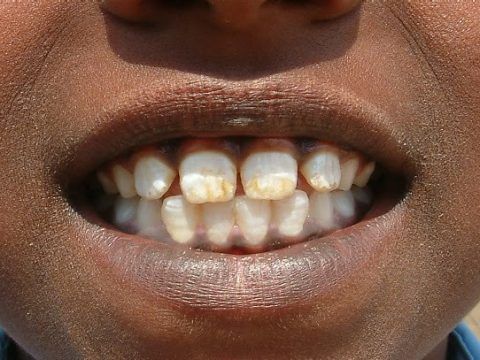World Oral Health Day: Understanding fluorosis in Kenya

Fluorosis is caused by excessive fluoride intake during early childhood when permanent teeth are still developing.
You have probably seen teeth with white, brown, or chalky patches, this is a condition known as dental fluorosis.
While it does not cause pain, severe cases can weaken enamel, making teeth prone to damage.
More To Read
- South Korean scientists develop patch to regrow human teeth
- Beyond Sugar: Common foods linked to baby tooth decay
- African health ministers adopt regional framework to fight oral diseases
- Dental problems and cavities during breastfeeding: How moms are affected
- Electric toothbrush or manual? Which one is the best?
- Dental care in Kenya: High costs and tradition limit access to essential oral health services
Fluorosis is caused by excessive fluoride intake during early childhood when permanent teeth are still developing.
As Kenya marks World Oral Health Day on Thursday, the condition has become a growing concern, especially in regions where fluoride levels in water exceed safe limits.
The first National Oral Health Survey of 2015 reported that fluorosis affects 41.4% of children and 34.3% of adults in Kenya, with some of the worst cases found in areas where boreholes and natural springs serve as the primary sources of drinking water.
In parts of Nakuru, Baringo, Naivasha, Machakos, Makueni and Kajiado, fluoride levels in groundwater can exceed 5 mg/L, more than three times the World Health Organization’s recommended limit of 1.5 mg/L.
A recent study by the Kenya Medical Research Institute (KEMRI) found that over 40% of school-aged children in high-fluoride regions show visible signs of fluorosis, with some experiencing brittle teeth.
Dr Mark Mbuvi, a Nairobi-based dentist, explains that while fluoride is essential for preventing cavities, too much of it during childhood can lead to permanent discolouration and, in severe cases, weakened enamel.
He advises parents to monitor their children’s fluoride intake by being mindful of drinking water sources, toothpaste, and foods such as tea, which naturally contain fluoride.
Causes
The main cause of fluorosis in Kenya is prolonged exposure to high-fluoride water, particularly from boreholes, wells, and untreated springs.
Other contributing factors include the use of fluoride-rich toothpaste, fluoridated salt, and a general lack of awareness about fluoride levels in household drinking water.
Many families unknowingly expose their children to excessive fluoride from multiple sources, increasing the risk of developing the condition.
To address the issue, the Ministry of Health, in collaboration with dental associations and public health organizations on Thursday, launched awareness campaigns educating Kenyans on how to prevent fluorosis in Makueni.
Mbuvi also said that households are encouraged to test their water sources for fluoride levels and, where necessary, seek alternative drinking water sources.
Other Topics To Read
He also recommends using age-appropriate toothpaste for young children to prevent overexposure.
In areas with high fluoride levels, defluorination techniques such as filtering water through bone char or using reverse osmosis are being promoted as safer alternatives.
As part of World Oral Health Day activities, experts are emphasizing the importance of early check-ups and preventive care.
Dr Elkana Akali of Dentmind Dental Center urges families to schedule dental visits at least twice a year to detect and manage oral health issues early.
He advises parents to take their children for their first dental visit by the age of one, ensuring proper dental development and cavity prevention.
He also warns against excessive consumption of sugary snacks, carbonated drinks, and processed juices, which contribute to tooth decay.
Additionally, he cautions against frequent intake of alcohol, shisha, and acidic foods such as soda, citrus fruits, and vinegar-based products, as they can erode enamel and worsen dental problems.
With fluorosis cases on the rise, experts stress the need for long-term solutions, including government investment in safe drinking water.
In high-risk areas, providing access to treated water and fluoride monitoring systems remains critical in reducing exposure. Community-driven initiatives promoting water purification and alternative water sources can also help lower fluoride intake, especially in affected regions.
As Kenya observes World Oral Health Day, the focus is on prevention, awareness, and long-term solutions to ensure better oral health for future generations.
By promoting safe drinking water, proper oral hygiene, and increased public education on fluorosis risks, experts hope to curb its prevalence and protect children's smiles for years to come.
Top Stories Today













































